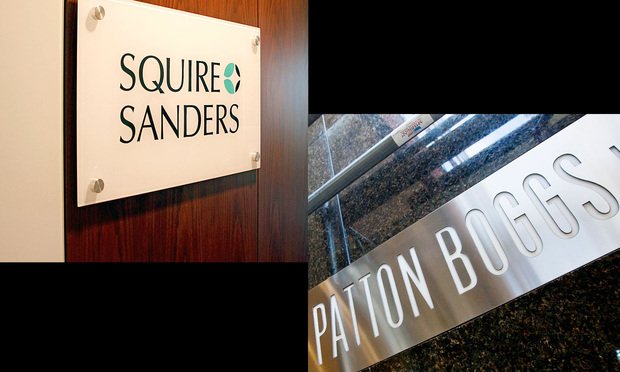Squire Sanders, a global law firm with roots in Cleveland, will combine with Washington, D.C., lobbying powerhouse Patton Boggs to form Squire Patton Boggs, the firms announced on Friday. The combination will take effect on June 1.
Following a sudden suspension in Squire Sanders’ partner vote Thursday morning and its resumption that evening, the partners there approved the merger on Friday. Patton Boggs’ partners voted to approve the tie-up on Monday, the firms confirmed in a press release stamped with the new name.
The approval by both partnerships capped almost six months of negotiations between the financially struggling Patton Boggs, which has declined from 485 lawyers at the end of 2012 to about 325 lawyers, and 1,227-lawyer Squire Sanders.
The combined firm will encompass 45 offices in 21 countries worldwide and roughly 1,550 lawyers, making it about the 21st-largest firm worldwide, viewed against last year’s American Lawyer Global 100 list.
The firm will rank as one of the 10 largest firms in Washington, with approximately 280 lawyers there, and among the largest in the United States, with roughly 785 lawyers.
The firms did not make their leaders available for immediate comment, but in a statement, James Maiwurm, chairman and global chief executive officer of Squire Sanders, said that “today marks an important day in the history of our firm. Patton Boggs is the premier public policy firm in the world, and this combination establishes us as the ‘go-to’ firm for public policy work.”
Mark Ruehlmann, a Squire Sanders chairman-elect who will become chairman and CEO of the combined firm next January, said that the firm’s goal “has long been to create a platform that allows our lawyers to serve their clients no matter where in the world their business needs take them.”
Noting the global spread of Squire Sanders, Ed Newberry, Patton Boggs’ managing partner, said “the platform and collective expertise created through this combination provide considerable opportunities to access new markets, engage clients in new ways and attract and retain top talent. I couldn’t be more excited for the future of our firm.”
Additional leadership changes will be announced on Tuesday, the leaders said. Newberry will serve in a top leadership position and Squire Sanders’ 12-member executive committee will be expanded to incorporate members from Patton Boggs, according to a source at Patton Boggs.
The consummation of the merger came two months after the firms signed a letter of intent, and a few weeks after the partnerships exchanged financial information. The past two months were marked by informal interaction between practice groups and offices as partners considered “cultural” fit, according to two knowledgeable sources.
Both firms’ foreign offices exchanged delegations, according to a Patton Boggs partner. Squire Sanders is a Swiss verein, in which a number of firms share the same brand but maintain separate finances. At press time it was not yet known whether Patton Boggs would be incorporated entirely into the U.S. portion of Squire Sanders’ verein.
Late Hitch
The Squire Sanders vote finished one day late after a surprise court filing on Thursday morning briefly threw the process into chaos. The filing, in the Southern District of New York, asked the court to reopen and to reject a $15 million settlement between Patton Boggs and Chevron Corp. related to that firm’s involvement in environmental litigation against the company in Ecuador. In March a federal judge found the lead plaintiffs lawyer liable for a wide variety of misconduct.
Absent that settlement, partners at the merged firm would potentially be exposed to vast new legal liability. Squire Sanders management suspended the vote for 12 hours but ultimately decided to proceed, the firm said.
A trio of former partners and one current partner at Squire Sanders said support for the merger was mostly less than enthusiastic, but such qualms were not enough to scuttle the deal.
“I think that outside of D.C., most folks wondered how this was going to help them,” one former Squire Sanders partner said, adding that the merger would cement London and Washington as the new centers of gravity.
Squire Sanders, according to these and other current and former partners, was keenly interested in Patton Boggs’ premier lobbying practice—which includes, most prominently, founder Thomas Hale Boggs Jr. and a lobbying group acquired in 2010 and led by former Sens. Trent Lott and John Breaux.
Hogan Lovells partner Robert Bennett called the merger a “very smart move for both firms.” Squire Sanders gets Patton Boggs’ “Washington know-how,” he said, and Patton Boggs can continue to operate.
“Tommy Boggs built a great and powerful institution, no question about it,” Bennett said, noting that he and Boggs knew each other from their days as undergraduates at Georgetown University. He predicted the Chevron controversy “will be old news pretty quick.”
Bennett viewed the merger as “part of what’s happening today. There are just a lot of mergers, and this is the nature of the practice as you have globalization. Firms have to be in a position, if they want to stay competitive, to be able to serve clients all over the place.”
Squire Sanders was certainly interested in Patton Boggs’ operations in the Middle East—the firm has 23 lawyers at offices in Abu Dhabi, Doha, Dubai and Riyadh. Squire Sanders has only 10 lawyers in Riyadh, according to another ex-partner from an international office of Squire Sanders and a current partner in Washington. Those Patton Boggs offices collectively generated business worth at least $100 million per year, according to the senior partner at Squire Sanders.





